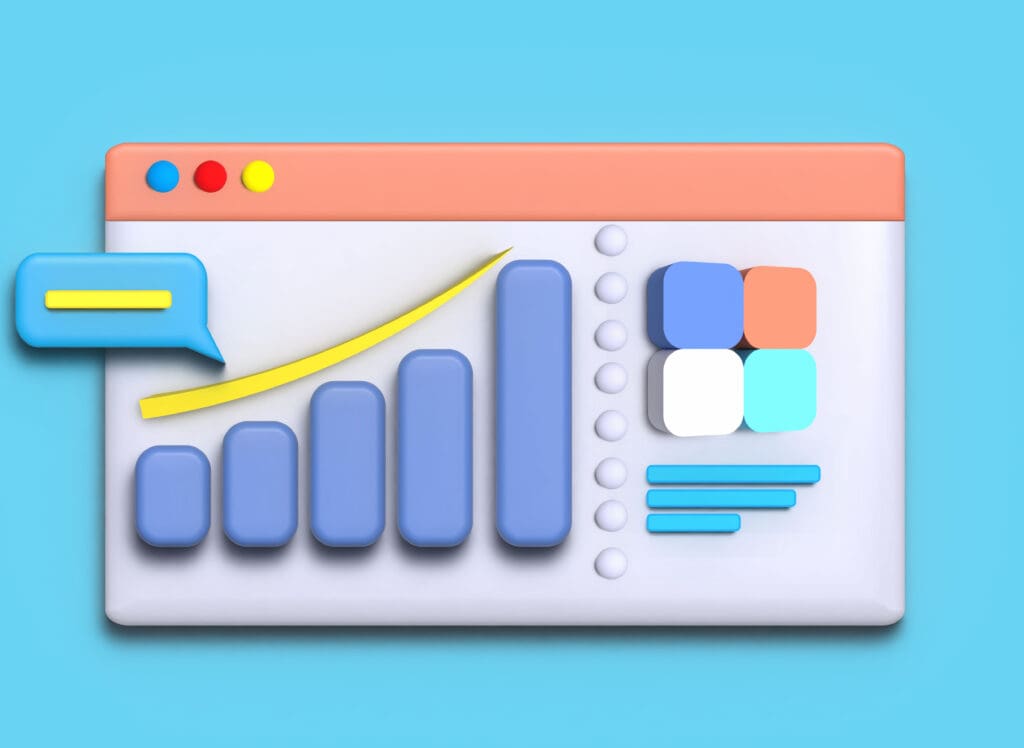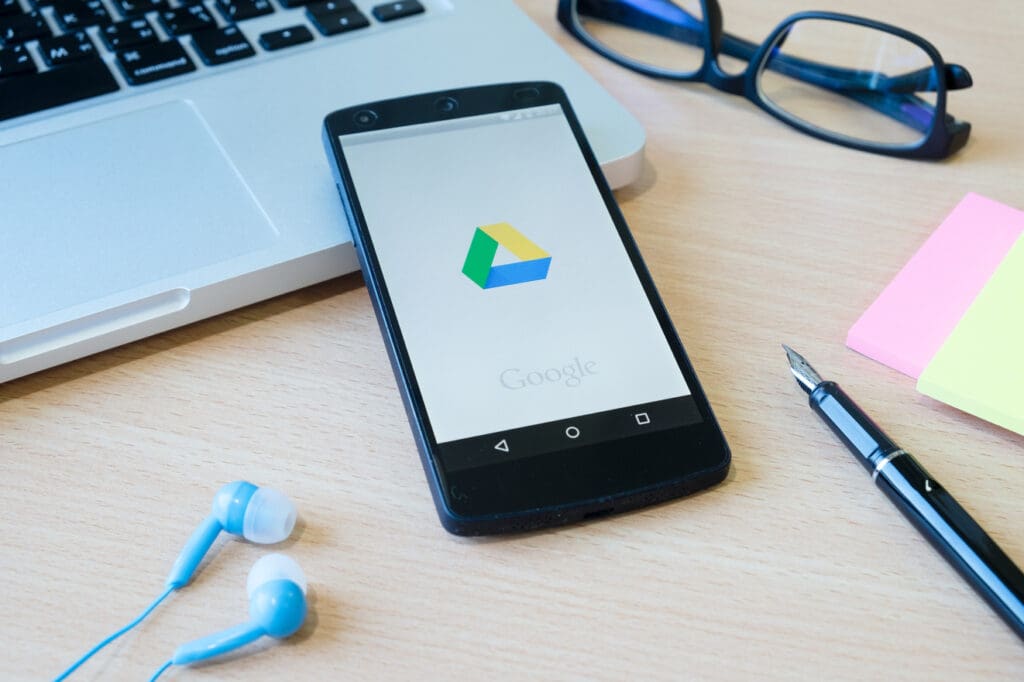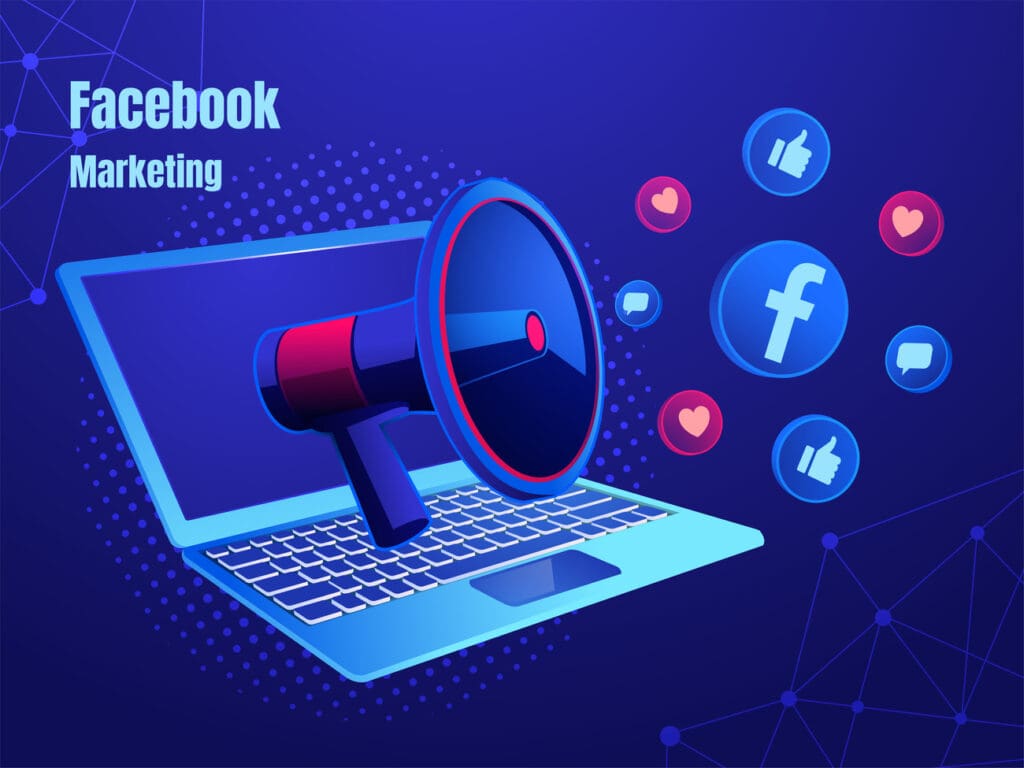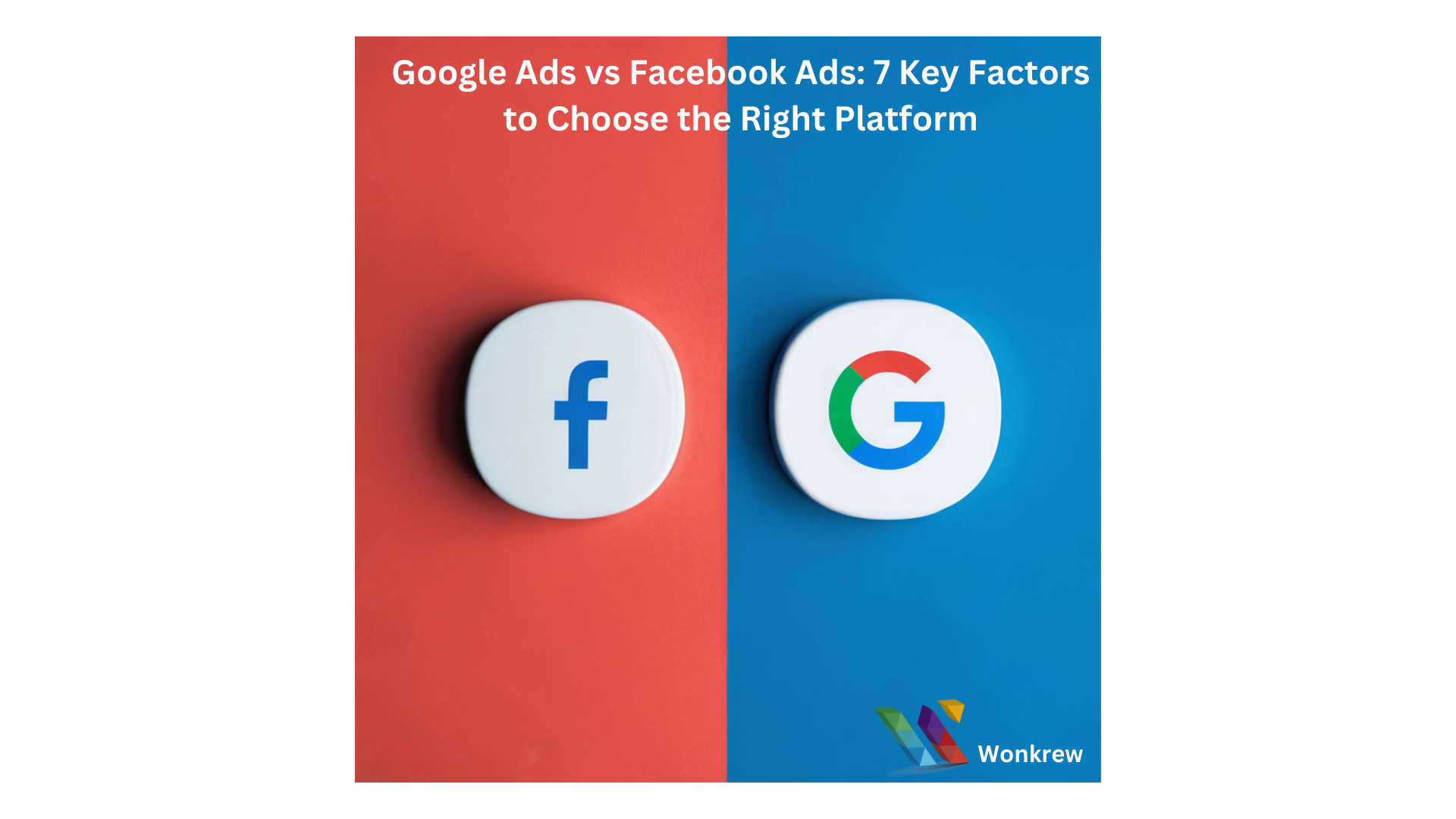Table of Contents
When it comes to choosing the right platform for advertising, the age-old debate of Google Ads vs Facebook Ads continues to dominate the conversation. Both platforms offer incredible opportunities for businesses, but they cater to different goals, audiences, and strategies. So, how do you decide which one is the best for your business?
At Wonkrew, the best digital marketing agency in Chennai, we’ve guided numerous businesses through this decision-making process. Now, let’s explore the difference between Facebook Ads and Google Ads, knowing 7 key factors to help you make the right choice for your business.
What is Facebook Ads?
Facebook Ads is an advertising platform provided by Facebook (now part of Meta) that allows businesses to display their ads across Facebook, Instagram, Messenger, and the Audience Network. These ads are highly visual and can be targeted to specific audiences based on their demographics, interests, behaviors, and location. Businesses can create various ad formats, including image ads, video ads, carousel ads, story ads, and more.
Key Benefits of Facebook Ads:
- Advanced Audience Targeting: Pinpoint audiences based on detailed user data.
- Creative Freedom: Use engaging visuals and formats to connect with your audience.
- Cost-Effective: Often has a lower cost-per-click compared to search ads.
- Great for Awareness: Ideal for building brand recognition and engaging users socially.
What is Google Ads?
Google Ads (formerly Google AdWords) is Google’s advertising platform that helps businesses display their ads on Google’s search results, YouTube, Gmail, and a network of partner websites. It operates on a pay-per-click (PPC) model, meaning advertisers pay only when someone clicks on their ad. These ads are triggered by user search queries, making them highly intent-driven.
Key Benefits of Google Ads:
- Search Intent: Connects with users actively looking for specific products or services.
- Wide Reach: Appears on Google Search, Display Network, and YouTube.
- Scalable: Works for small local businesses and large enterprises alike.
- Customizable: Offers control over budget, targeting, and ad placement.
Google Ads vs Facebook Ads: A Quick Comparison
Here’s a comparison table highlighting the key differences between Google Ads and Facebook Ads:
| Aspect | Google Ads | Facebook Ads (Meta Ads) |
| Platform Type | Keywords, user intent, demographics | Social media platform (Facebook, Instagram, Messenger, Audience Network) |
| Ad Targeting | Keywords, user intent, demographics | Interests, behaviors, demographics, custom audiences |
| Primary Objective | Capture high-intent users actively searching for products/services | Build awareness, engage users, and foster interest through visually appealing content |
| Cost | Higher cost-per-click (CPC) for competitive keywords, based on bidding | Generally lower CPC, ideal for budget-friendly campaigns |
| Ad Formats | Text ads, display ads, shopping ads, video ads (e.g., YouTube) | Image ads, video ads, carousel ads, story ads, collection ads |
| Best For | Driving conversions, high-intent traffic, lead generation | Building brand awareness, engaging users, and targeting niche audiences |
| Target Audience | Users with a clear search intent (e.g., “buy shoes online”) | Users based on lifestyle, interests, or behaviors |
| Analytics | Detailed insights into search terms, ad performance, and conversions | Audience behavior insights, engagement metrics, and visual performance tracking |
| Campaign Setup Complexity | Requires keyword research and intent understanding | Focused on creative visuals and audience targeting |
| Reach | Billions of daily searches across Google’s Search and Display Network | Over 3 billion monthly active users across Facebook, Instagram, and other Meta platforms |
| Integration | Seamless integration with search, YouTube, Gmail, and Google partners | Cross-platform visibility on Facebook, Instagram, Messenger, and beyond |
| ROI Potential | Higher ROI for businesses targeting high-conversion keywords | Higher ROI for businesses focusing on long-term audience engagement |

7 Key Factors to Consider When Choosing Between Google Ads and Facebook Ads
Let’s dive into the difference between Facebook Ads and Google Ads, exploring 7 key factors to help you make the right choice for your business.
1. Understanding the Platforms: Search vs Social
The first thing to understand about the difference between Google Ads and Facebook Ads is their core functionality.
- Google Ads (also known as Google Business Ads) works as a search-based platform. When someone types a query like “best pizza near me,” Google shows ads based on the keywords they searched for. It’s all about fulfilling user intent.
- Facebook Ads, on the other hand, focus on social behavior. These ads appear in users’ feeds based on their interests, behaviors, and demographics.
Who should use what?
If your audience actively searches for your product or service (e.g., “buy running shoes online”), Google Ads might work better. If your audience isn’t actively searching but would respond to engaging, eye-catching content (e.g., “New trendy shoes to rock your look”), Facebook Ads can shine.
2. Audience Targeting Capabilities
Facebook (or Meta Advertising, which includes Instagram Ads) allows laser-focused audience targeting. You can target users based on:
- Age, gender, and location.
- Interests (e.g., fitness, fashion).
- Behavior (e.g., online shopping habits).
With Google Ads, you’re targeting based on keywords, intent, and search queries. For instance, if someone searches “how Google Ads work,” your ad can appear if you bid on that keyword.
Pro Tip:
For businesses trying to build awareness among a specific audience, Facebook Ads often have the edge. But if you’re focused on conversions from people actively looking for your services, Google Ads is the way to go.
3. Cost and ROI
Let’s address the elephant in the room: cost.
- Google Ads cost in India varies depending on the competition for keywords. High-demand keywords like “real estate in Chennai” might cost more per click compared to niche searches.
- Facebook Ads generally have a lower cost-per-click (CPC), but the ROI depends on the quality of your creative and audience targeting.
Real Talk:
If you’re running on a tight budget and want maximum visibility, Facebook Ads might seem more attractive. But don’t ignore the value of Google Ads in driving high-intent traffic. Both platforms require strategic planning to ensure good returns.

4. Ad Formats and Creative Freedom
Both platforms offer diverse ad formats, but they cater to different needs:
- Google Ads primarily focus on text-based ads, search ads, display ads, and video ads (via YouTube). These are ideal for businesses prioritizing functional information.
- Facebook Ads dominate the visual game, offering carousel ads, story ads, and engaging video formats. If you’re considering Instagram Ads vs Facebook Ads, remember they share the same platform for targeting and management.
What works best?
For visually-driven industries like fashion, food, or lifestyle, Facebook Ads can be a game-changer. Meanwhile, service-based industries like software or real estate might benefit more from Google’s intent-driven approach.
5. Campaign Objectives
Every business has different goals, and the choice between Google Ads vs Facebook Ads depends on your specific objectives:
- Google Ads: Perfect for lead generation, driving traffic, and increasing sales.
- Facebook Ads: Great for building brand awareness, retargeting, and creating a buzz around your business.
Case in Point:
If you’re launching a new product and want to create excitement, Facebook Ads can help build awareness. But if you want to directly drive sales, Google Ads can connect you with ready-to-buy customers.
6. Analytics and Reporting
Both platforms offer robust analytics, but their focus differs.
- Google Ads provides insights based on user intent, clicks, and conversions. It helps you understand how people search for your product.
- Facebook Ads offers detailed demographic insights, helping you refine your audience.
Pro Insight:
Use the analytics tools on both platforms to complement each other. For instance, run a Google Ads campaign to find high-intent keywords and use Facebook Ads to retarget users who’ve shown interest.
7. Integration with Your Business Goals
At Wonkrew, we often ask clients one simple question: What’s your immediate goal?
- If your goal is instant conversions or reaching people actively looking for your service, go with Google Ads.
- If you’re looking to build a community, increase engagement, or target niche groups, Facebook Ads advantages stand out.
Example:
Let’s say you run a fitness studio in Chennai. If people search “best fitness studio in Chennai,” Google Ads can directly bring them to your website. But if you want to engage users with workout tips, transformation stories, or special offers, Facebook Ads might drive better engagement.

Choosing the Right Platform: A Balanced Approach
The debate isn’t really about Google Ads vs Facebook Ads. Often, the best approach is using both together. For example:
- Start with Google Ads to target high-intent users.
- Use Facebook Ads for retargeting or to build a long-term connection with your audience.
This dual strategy ensures you’re visible to users at every stage of their journey—from discovery to conversion.
Conclusion
At the end of the day, there’s no one-size-fits-all answer to the difference between Google Ads and Facebook Ads. The right choice depends on your business goals, audience, and budget.
At Wonkrew, the best digital marketing agency in Chennai, we’ve helped countless businesses navigate this decision. Whether you’re curious about how Google Ads work, need advice on Google Ads cost in India, or want to explore the advantages of Facebook Ads, we’re here to guide you.
If you’re still unsure about what works best for your business, let’s have a chat. Drop us a message, and we’ll help you craft a tailored strategy that delivers results.
Ready to take your advertising game to the next level? Let’s talk!
Frequently Asked Questions (FAQ’s)
1. Google Ads or Meta Ads?
It depends on your goals. Google Ads are better for intent-driven searches, while Meta Ads excel in audience engagement and building brand awareness.
2. Is Meta Better than Google?
Neither is inherently better. Meta excels in visual storytelling and social engagement, while Google dominates search intent and direct conversions.
3. Better than Google Ads?
For search intent, no. But platforms like Meta, LinkedIn, or TikTok may outperform Google Ads for specific audiences or goals, such as engagement or niche targeting.
4. Why Meta Ads Are Best?
Meta Ads provide unparalleled audience targeting, creative flexibility, and the ability to engage users across Facebook, Instagram, and Messenger with immersive, visually appealing ad formats.
5. Most Successful Facebook Ads?
Carousel ads, video ads, and story ads are highly successful, especially when paired with precise targeting and compelling visuals that align with audience interests and behaviors.
6. Google Ads Better than Facebook Ads? For search-based campaigns and high-intent traffic, Google Ads are better. For brand awareness and audience engagement, Facebook Ads lead. Both excel when used strategically together.

